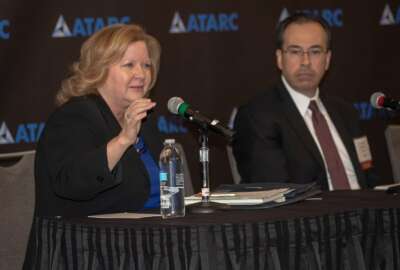

The Office of Management and Budget will soon launch a reskilling pilot aimed at bringing the federal workforce up to speed on data science skills.
In a spin-off from the Trump administration’s efforts to retrain federal employees for hard-to-fill cybersecurity jobs, the Office of Management and Budget will soon launch a reskilling pilot aimed at bringing the federal workforce up to speed on data science skills.
In a departure from the cyber reskilling academy, which so far has trained two cohorts of employees from across the government, the upcoming data reskilling academy will not only train front-line federal employees for data-centric jobs. It’ll also give managers and executives a primer in how data science can help them carry out their agency’s mission.
Federal Deputy Chief Information Officer Margie Graves said getting agency executives to understand the art of the possible with data “will drive those executives to actually ask for that capability, and then we will fill in behind it with the talent that’s necessary to actually deliver on that.”
“We’re telling people this is not about training the practitioner, it’s also about data literacy for the executives all the way through the practitioners, so the executives understand what data can do for them,” Graves said Friday at an ACT-IAC conference.
While OMB is looking to scale up its current playbook for cyber reskilling within agencies, Graves said one of the lessons learned from the project was that agencies face a critical shortage of data scientists.
“They need to exist in economist areas, they need to exist in scientific areas, they need to exist in technological areas,” she said.
As part of the administration’s Federal Data Strategy, the Office of Personnel Management is working on a governmentwide job series for data scientists that the agency expects to release later this month.
Graves said OMB has “seed money” to launch the data reskilling project in partnership with the Commerce Department. In another twist, Graves said this data cohort will rely more on pre-existing online learning.
Graves also said OMB recently held its first meeting of an internal data policy council, which she said focused on how the agency could enable greater inter-agency data sharing “with less friction.”
Proposals included streamlining the memorandums of understanding (MOUs) that set the foundation for data exchanges between agencies.
“We also talked about how do we encourage the conversation between agencies that are in common business processes, because that doesn’t often occur organically,” Graves said. “We’d like to believe that it would, but sometimes people are still stuck in that cultural mode … where they see it as a system boundary, as opposed to data as an enterprise asset. The ability to look at the end to end mission delivery and understand what every agency play in terms of a role in that equation in the delivery of the endgame is a critical role for OMB.”
Margaret Weichert, OMB’s deputy director for management, said prior to the President’s Management Agenda, modernization projects on data hygiene didn’t get the same level of attention as IT modernization projects.
“When we embarked on asking questions about the President’s Management Agenda and really how are we going to modernize government, it was very clear to me that data had languished as a subset under IT modernization for far too long. And it was far too powerful a concept to just be thought of in the shadow of IT,” Weichert said.
While data science stands apart as its own discipline, data privacy and data hygiene issues overlap in some ways with IT modernization. Several agency chief data officers, for example, also serve as chief information officers.
More importantly, Weichert said vulnerabilities in legacy IT can jeopardize the security of sensitive data sets, such as in the case of the 2015 OPM data breach.
“This archaic set of technologies has a major impact on the reliability, the usability, the safety and security of our data,” Weichert said. “And so focusing on structure and hygiene has to be a priority.”
A final draft of Federal Data Strategy, she said, will be released around mid-December.
Nick Hart, president of the Data Foundation and CEO of the Data Coalition, said the inclusion of agency executives in the upcoming data reskilling effort reflects a need to bring data literacy to every level of government.



To help build that data literacy, Maria Roat, the CIO of the Small Business Administration, said her office held a data open house at SBA about two years ago.
Among its data projects, Roat said the open house feature a map of the United States showing the distribution of the agency’s $200 billion small-business loan portfolio. The project was such a success that former SBA Administrator Linda McMahon paid a visit.
Roat said SBA has also taken steps to break down some of the silos around data, an effort that has already had grassroots support in several program offices.
“There was this whole informal network going on, so over the last six months, we’ve surfaced that [and] we’re learning what the connections are,” Roat said.
Copyright © 2024 Federal News Network. All rights reserved. This website is not intended for users located within the European Economic Area.
Jory Heckman is a reporter at Federal News Network covering U.S. Postal Service, IRS, big data and technology issues.
Follow @jheckmanWFED
